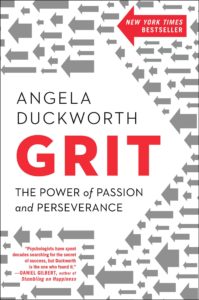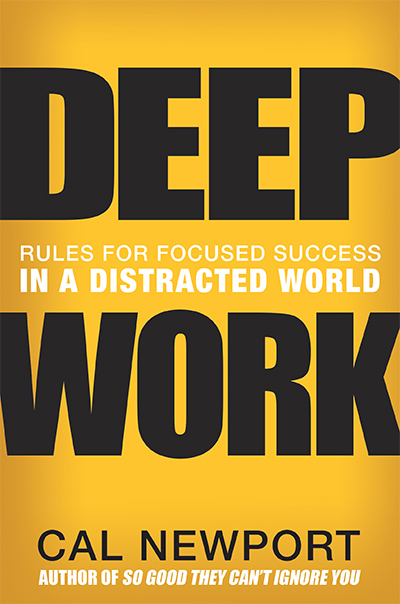Deep Work by Cal Newport
If you want your career to survive technology, I recommend reading this book. Since reading it I have drastically cut out notifications, social media, interruptions, and multitasking, but there’s still far more to go. Reading the book is really just the beginning to shifting your life and training your brain so you can achieve meaningful work. Required reading for anyone who designs an office or says, “Let’s make work chat required!”
The Obstacle is the Way by Ryan Holiday
I never understood stoicism until I read this book. Stoicism, it turns out, is philosophy that’s actually helpful. It’s a strong medicine. Really helpful and really hard.
Sapiens by Yuval Noah Harari
There’s a reason why everyone recommends this book. Sapiens peels away the frame of reference that comes from waking up a homo sapien in this 100-year timespan.
Influence by Robert B. Cialdini
This book is powerful. Like scarily so. Just like Sapiens, this is a must-read for being a homo sapien. The best book on marketing I’ve read.
The Untethered Soul by Michael A. Singer
Presents mindfulness in a unique and approachable way. There’s something about the writing style that opened up the experience for me. I found the book more impactful in text than audio.
Waking Up by Sam Harris
Gives a compelling argument for the importance of mindfulness practices. This book is particularly useful for someone skeptical of Buddhism and ‘gurus’ but who wants to reap the benefits of meditation. I found Harris’s argument against the existence of a self particularly enlightening.
How to Get Filthy Rich in Rising Asia by Mohsin Hamid
One of those books that made me lose sleep because I had to finish it in one sitting. So rich with the pain, majesty, and beauty that is life. Also written in the second person! Who pulls that off? This guy, Mohsin Hamid. Excerpt here — go read it!
The Power of Now by Eckhart Tolle
Not sure why it took me until 2016 to read this classic. I love Eckhart Tolle’s story and message. However, I would agree with Dan Harris (author of 10% Happier, below) when he says that Tolle’s message can be a little tricky to apply. Still, reading this is useful as it gives a window to a way of being where every moment is enough.
Grit by Angela Ducksworth
Don’t attribute talent to people who succeed; attribute perseverance. Another book I wish I’d read at 15 instead of 30.
Superhuman by Habit by Tynan
This is a great quick read for those who have read The Power of Habit but want more ideas and inspiration for growing their habits. I loved being reminded of how much you can consciously shape your life and your thoughts, words, and actions if you just take the time to ‘load’ the habit. I also appreciated Tynan’s conviction that habits must be done daily in order to stick. This made me reevaluate the habits I’m working on and critically examine if they were important enough to do daily.
Elon Musk by Ashlee Vance
Key takeaway: Elon Musk is a superhuman who eats ice cream. I was surprised to learn how much Elon Musk had to lose at one point. Speaks to the power of sitting with tension. Hoping for a live action version of this sometime. 🙂
The Code of the Extraordinary Mind by Vishen Lakhiani
I feel like this is “The Universe Has Your Back” but with actual depth and substance. A treasure trove of interesting and unconventional ideas.
10% Happier by Dan Harris
Hilarious read on why meditation is the answer. Also made me realize that reporters are people, too.
Spark: The Revolutionary New Science of Exercise and The Brain by John J. Ratey
High schoolers were trained to exercise to hit their target heart rate. These kids started doing really well in school without any different instruction. The point? Exercise makes your brain work. I read 1/4 of this and put it down because I was like “I get it! Important! Will do!” I then proceeded to do the bare minimum amount of exercise for the next six months while avoiding the part of my head that had absorbed the ideas in this book. Then I started running every day and BAM! it turns out this book is right: exercise is the key to peak brain performance. I can’t believe I’ve spent most of my life *not* exercising. What a waste of mental productivity.
Mindset – the New Psychology of Success by Carol Dweck
There’s nothing you inherently can’t do or aren’t good at — you just haven’t gotten good at it yet. By adopting this mindset you can do far more. A must-read for parents, teachers, and managers.
The Diamond Cutter by Geshe Michael Roach
Correct your thinking, habits, and attitudes to solve your business problems.
When Breath Becomes Air by Paul Kalanithi
Biggest takeaway: neurosurgery is WAY harder than my job. Also, you’re alive and it’s precious so enjoy it before you get cancer and don’t finish writing a book. This book didn’t quite live up to its hype for me, but that says more about the hype than anything.
The Power of Full Enagement by Tony Schwartz and Jim Loehr
My takeaway from this book is that YES, there is something necessary about time with loved ones, time in nature, time restoring. By filling your batteries you’re able to work more effectively. There’s way more to the book than that, but that was what I hadn’t fully heard until that time.
So Good They Can’t Ignore You by Cal Newport
I wish I had had this book when I was 16, 18, 21, and 27. It argues that finding your passion is poor advice, as job satisfaction comes from mastery and craftsmanship.
Essentialism by Grego McKeown
Think you can do everything? Well you’re wrong. Cutting things and focusing on only what is truly essential is the path to success.
The Subtle Art of Not Giving a Fuck by Mark Manson
You can’t give a fuck about everything, so be selective. This is a fun, light read that’s a little bit helpful but mostly entertaining. As someone who cares way too much about most things, Manson’s message was appreciated.
The End of Jobs by Taylor Pearson
The era of you stay at a job for your whole life is over. Also, don’t expect to be able to find a job. Instead, become an entrepreneur—not the crazy, unsafe bet it’s made out to be in contrast to the shrinking job market.
The War of Art by Steven Pressfield
Art, or any creative activity, is suuuuuper hard. So just do it.
I Will Teach You to Be Rich by Ramit Sethi
Open a Roth IRA and invest in a lifecycle fund. Limit investment fees to the minimum. Have your savings be deducted automatically before you get paid.
Anything You Want by Derek Sivers
Inspired me to be more like Derek Sivers, quirky and 100% willing to think beyond the collective thinking.
The Dip by Seth Godin
Good advice on when to keep with it vs. when to pull out.
Growth Hacker Marketing by Ryan Holiday
Good introduction to growth hacking.
Ready Player One
Fun science fiction. I appreciated the ongoing plotline of VR vs. real life.
Algorithms to Live By
I appreciated the introduction to interesting computer science ideas, but it wasn’t as applicable as I expected. What I found most interesting was the “explore/exploit” problem. I have thought a lot about this myself—do I go visit cities around the world to find the best place to live, or should I settle down where I am because, from what I’ve seen so far, it’s pretty damn good? It turns out this is a computer science problem.
The Miracle Morning by Hal Elrod
Wake up early and do everything you know you should do (exercise, meditate, read, etc). Instead of reading the book, you could just put the idea into practice.
The Surrender Experiment by Michael A. Singer
A story of what happens if you decide to just keep surrendering to whatever was happening in his life.
Daring Greatly by Dr. Brene Brown
Be vulnerable, it’s how to be happy. I was hoping for more in this book, as everyone else seems to love it. Maybe I should read it again?
Who Moved My Cheese? by Spencer Johnson
If things change, change with them. Don’t keep looking for the same reward when times have changed; get looking for new rewards. Seems like common sense, but this parable is useful.
The E-Myth Revisited by Michael E. Gerber
This is a business classic. I found it a overly drawn out to make one point: Make your business franchise-able, meaning that every role and training process is replicable.
The New One Minute Manager by Spencer Johnson and Ken Blanchard
If your employees know their priorities and then you don’t have to manage them much.
It Starts with Food by Melissa Hartwig and Dallas Hartwig
Some good information on paleo thinking. I did a Whole 30 and it was helpful, though not life-changing (probably because my eating habits are already pretty good — I can imagine if you’re on the Standard American Diet this would be life-changing). Instead of doing more of these “I’ll eat perfect for X number of days” things, I’m working on iterative eating habits to slowly improve my diet habits in lasting ways.
Grain Brain by Dr. David Perlmutter
Eating grains and sugars causes dementia. Put that in your sandwich.
Delivering Happiness by Tony Hsieh
I liked the descriptions of the SF rave scene back in the day. Other than nostalgia for a party scene I missed, I didn’t find this book as inspiring as I had hoped.
The Bulletproof Diet by Dave Asprey
Drink coffee (well the coffee sold by Asprey) blended with butter and coconut oil (well the coconut oil sold by Asprey) for breakfast. Eat paleo with products sold by Asprey.
The 4-Hour Body by Tim Ferriss
Eat paleo with beans.
Start Something That Matters by Blake Mycoskie
Not a remarkable book, but fun to learn about the history of Toms.
The Primal Blueprint by Mark Sisson
Eat paleo. Live as caveman-like as possible.
The Universe Has Your Back by Gabrielle Bernstein
At first I loved this book. Then I started questioning its feel-good message. I’m spiritual enough to believe there’s some truth to it, but it felt way too sugary and sweet. Maybe my cynicism is just blocking the light.
Snow Crash by Neal Stephenson
I got halfway through before giving up on my hopes it would live up to its praise. I didn’t care about the characters or where the story was going, and the VR part failed to captivate. Maybe I’m missing something here?
The Goal by Jeff Cox and Eliyahu M. Goldratt
Maybe this book’s just for people in manufacturing, but I found it to have one point drawn out over too many pages.

